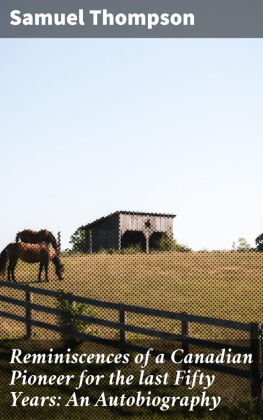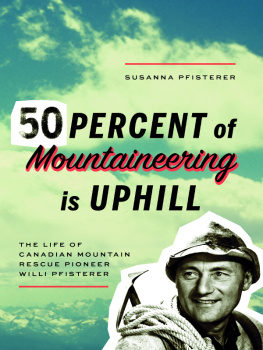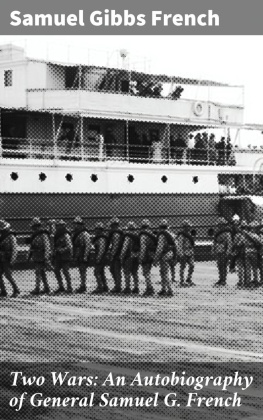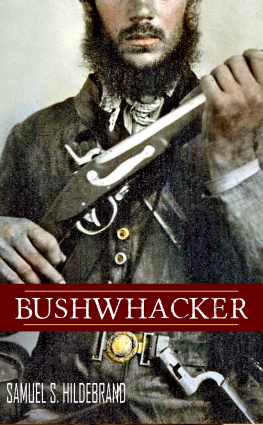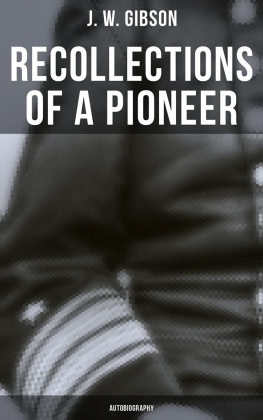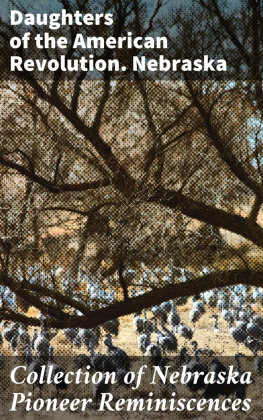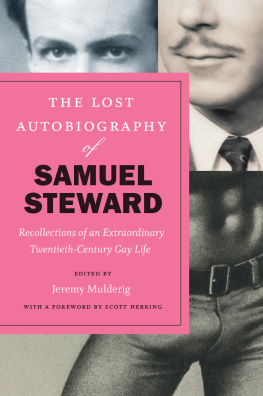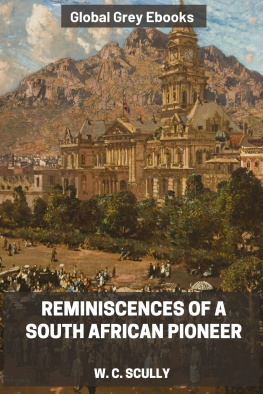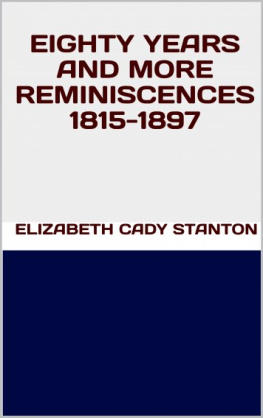PREFACE.
Table of Contents
I t was in consequence of a suggestion by the late S. J. Watson, Librarian of the Ontario Legislaturewho urged that one who had gone through so many experiences of early Canadian history as myself, ought to put the same on recordthat I first thought of writing these "Reminiscences," a portion of which appeared in the Canadian Monthly Magazine. For the assistance which has enabled me to complete and issue this volume, I am obliged to the kind support of those friends who have subscribed for its publication; for which they will please accept my grateful thanks.
In the space at my disposal, I have necessarily been compelled to give little more than a gossiping narrative of events coming under my own observation. But I have been careful to verify every statement of which I was not personally cognizant; and to avoid everything of a controversial character; as well as to touch gently on those faults of public men which I felt obliged to notice.
It has been a labour of love to me, to place on record many honourable deeds of Nature's gentlemen, whose lights ought not to be hidden altogether "under a bushel," and whose names should be enrolled by Canada amongst her earliest worthies. I have had the advantage, in several cases, of the use of family records, which have assisted me materially in rendering more complete several of the earlier chapters, particularly the account of Mackenzie's movements while in the neighbourhood of Gallows Hill; also the sketches of the "Tories of Rebellion Times;" as well as the history of the Mechanics' Institute, in which though a very old member, I never occupied any official position.
Since the first part of these pages was in type, I have had to lament the deaths of more than one comrade whose name is recorded therein; amongst them Dr. A. A. Riddelmy "Archie"and my dearest friend Dr. Alpheus Todd, to whom I have been indebted for a thousand proofs of generous sympathy.
THE AUTHOR.
CHAPTER I.
Table of Contents
THE AUTHOR'S ANTECEDENTS AND FORBEARS.
Table of Contents
T he writer of these pages was born in the year 1810, in the City of London, and in the Parish of Clerkenwell, being within sound of Bow Bells. My father was churchwarden of St. James's, Clerkenwell, and was a master-manufacturer of coal measures and coal shovels, now amongst the obsolete implements of by-gone days. His father was, I believe, a Scotsman, and has been illnaturedly surmised to have run away from the field of Culloden, where he may have fought under the name and style of Evan McTavish, a name which, like those of numbers of his fellow clansmen, would naturally anglicise itself into John Thompson, in order to save its owner's neck from a threatened Hanoverian halter. But he was both canny and winsome, and by-and-by succeeded in capturing the affections and "tocher" of Sarah Reynolds, daughter of the wealthy landlord of the Bull Inn, of Meriden, in Warwickshire, the greatest and oldest of those famous English hostelries, which did duty as the resting-place of monarchs en route, and combined within their solid walls whole troops of blacksmiths, carpenters, hostlers, and many other crafts and callings. No doubt from this source I got my Warwickshire blood, and English ways of thinking, in testimony of which I may cite the following facts: while living in Quebec, in 1859-60, a mason employed to rebuild a brick chimney challenged me as a brother Warwickshire man, saying he knew dozens of gentlemen there who were as like me "as two peas." Again, in 1841, a lady who claimed to be the last direct descendant of William Shakespeare, of Stratford-upon-Avon, and the possessor of the watch and other relics of the poet, said she was quite startled at my likeness to an original portrait of her great ancestor, in the possession of her family.
My grandfather carried on the business of timber dealer (we in Canada should call it lumber merchant), between Scotland and England, buying up the standing timber in gentlemen's parks, squaring and teaming it southward, and so became a prosperous man. Finally, at his death, he left a large family of sons and daughters, all in thriving circumstances. His second son, William, married my mother, Anna Hawkins, daughter of the Rev. Isaac Hawkins, of Taunton, in Somersetshire, and his wife, Joan Wilmington, of Wilmington Park, near Taunton. My grandfather Hawkins was one of John Wesley's earliest converts, and was by him ordained to the ministry. Through my mother, we are understood to be descended from Sir John Hawkins, the world-renowned buccaneer, admiral, and founder of the English Royal Navy, who was honoured by being associated with her most sacred Majesty Queen Elizabeth, in a secret partnership in the profits of piratical raids undertaken in the name and for the behoof of Protestant Christianity. So at least says the historian, Froude.
One word more about my father. He was a member of the London trained-bands, and served during the Gordon riots, described by Dickens in "Barnaby Rudge." He personally rescued a family of Roman Catholics from the rioters, secreted them in his house on Holborn Hill, and aided them to escape to Jamaica, whence they sent us many valuable presents of mahogany furniture, which must be still in the possession of some of my nephews or nieces in England. My mother has often told me, that she remembered well seeing dozens of miserable victims of riot and drunkenness lying in the kennel in front of her house, lapping up the streams of gin which ran burning down the foul gutter, consuming the poor wretches themselves in its fiery progress.
My father died the same year I was born. My dear mother, who was the meekest and most pious of women, did her best to teach her children to avoid the snares of worldly pride and ambition, and to be contented with the humble lot in which they had been placed by Providence. She was by religious profession a Swedenborgian, and in that denomination educated a family of eleven children, of whom I am the youngest. I was sent to a respectable day-school, and afterwards as boarder to a commercial academy, where I learnt the English branches of education, with a little Latin, French, and drawing. I was, as a child, passionately fond of reading, especially of Homer's Iliad and Odyssey, and of Sir Walter Scott's novels, which latter delightful books have influenced my tastes through life, and still hold me fascinated whenever I happen to take them up.
So things went on till 1823, when I was thirteen years old. My mother had been left a life-interest in freehold and leasehold property worth some thirty thousand pounds sterling; but, following the advice of her father and brother, was induced to invest in losing speculations, until scarcely sufficient was left to keep the wolf from the door. It was, therefore, settled that I must be sent to learn a trade, and, by my uncle's advice, I was placed as apprentice to one William Molineux, of the Liberty of the Rolls, in the district of Lincoln's Inn, printer. He was a hard master, though not an unkind man. For seven long years was I kept at press and case, working eleven hours a day usually, sometimes sixteen, and occasionally all night, for which latter indulgence I got half a crown for the night's work, but no other payment or present from year's end to year's end. The factory laws had not then been thought of, and the condition of apprentices in England was much the same as that of convicts condemned to hard labour, except for a couple of hours' freedom, and too often of vicious license, in the evenings.


